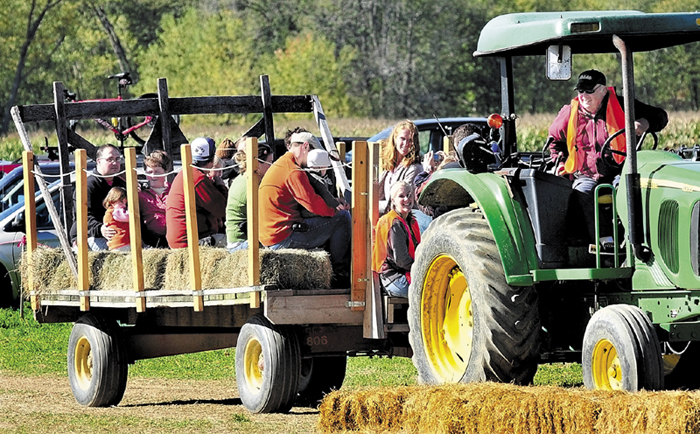FARMINGTON — For decades, Herbert “Bussie” York tinkered with running his farm.
He started producing organic milk, experimented with different crops and adopted new technology.
Four years ago, he made another change, that time to draw visitors to Sandy River Farms with a corn maze and a pick-it-yourself pumpkin patch as part of Maine’s agritourism movement.
Then, in June 2011, he opened a farmstand on his property, selling his and other farmers’ products and bringing even more people to his family farm.
Now, an agricultural education program of the University of Maine is branching into agritourism to help farmers like York across the state. Some examples are corn mazes, pick-your-own fruit and vegetable operations, cut-your-own Christmas tree farms, bed-and-breakfasts on farms, produce stands and farm-education programs
“We’re trying to create awareness of this as a business opportunity,” said John Rebar, executive director of the University of Maine Cooperative Extension.
He said Maine is a good place for agritourism because it has a history of diverse agriculture businesses.
“It’s really a part of our heritage and economy,” he said. “We’ve got everything from eggs to apples to aquaculture.”
Since May, the extension office began statewide programming to teach farmers about this growing business trend.
Marc Edwards is the person focusing on agritourism statewide for the extension office. He works from Franklin County office in Farmington.
He said agritourism is broadly defined as any visit to a farm to buy farm products or for a farm-related activity.
Edwards said as part of the developing program, he is hosting workshops called Agritourism 101 through the different county extension offices. The program walks farmers through the benefits and costs of starting various agritourism projects.
Through the workshop, he said, he tries to help farmers consider an historic farmhouse, a crop that could become pick-it-yourself or another current aspect that could bring people to the farm.
York, 73, said he opened the maze and the farmstand because he is always searching for another way to get his farm products to people.
“I try to take advantage of opportunities as they come,” he said.
He said the location of his farm, which U.S. Route 2 winds through, lets him take advantage of Maine’s growing buy-local culture.
Attitudes have changed, he said, from 25 years ago, when professors and doctors looking down on the idea of buying milk straight from a farm.
Now, he said, the area’s well-off residents are creating market value for farmstands such as his, where they can pull off the highway and buy milk that was walked from his cows to his store.
York said starting an agritourism business can involve large upfront costs.
He estimated the stand cost $250,000 to build, furnish and equip, including several commercial refrigerators.
The corn maze cost $20,000 initially, and he said he puts more work into the maze infrastructure each year.
He said it was expensive to hire help, construct the building, route utilities and furnish a building to hold meat and dairy.
“That’s not the kind of cost you’ll be able to recoup in five years,” he said.
He said he is considering creating a small food-processing business where local growers could can and package their fruit and vegetables.
York said for traditional farmers, the idea of branching into agritourism can be daunting for more than financial reasons. He said it takes not only cash but courage to open something such as a farmstand.
“It’s always a risk to start something new like that. You don’t know how it’s going to turn out,” he said.
His new ventures make only a fraction of the farm’s total profit, he said, but he thinks agritourism also is indirectly valuable because it creates awareness.
He said he hopes the more people interact with local farms through activities such as a corn maze, the more they think about where their food comes from.
“I think there is more indirect benefit, because it helps people value small farmers and want to buy their products,” he said.
Kaitlin Schroeder — 861-9252
kschroeder@mainetoday.com
Send questions/comments to the editors.



Success. Please wait for the page to reload. If the page does not reload within 5 seconds, please refresh the page.
Enter your email and password to access comments.
Hi, to comment on stories you must . This profile is in addition to your subscription and website login.
Already have a commenting profile? .
Invalid username/password.
Please check your email to confirm and complete your registration.
Only subscribers are eligible to post comments. Please subscribe or login first for digital access. Here’s why.
Use the form below to reset your password. When you've submitted your account email, we will send an email with a reset code.